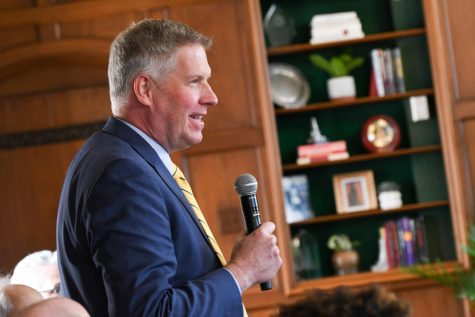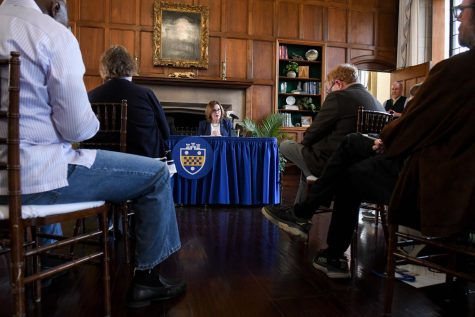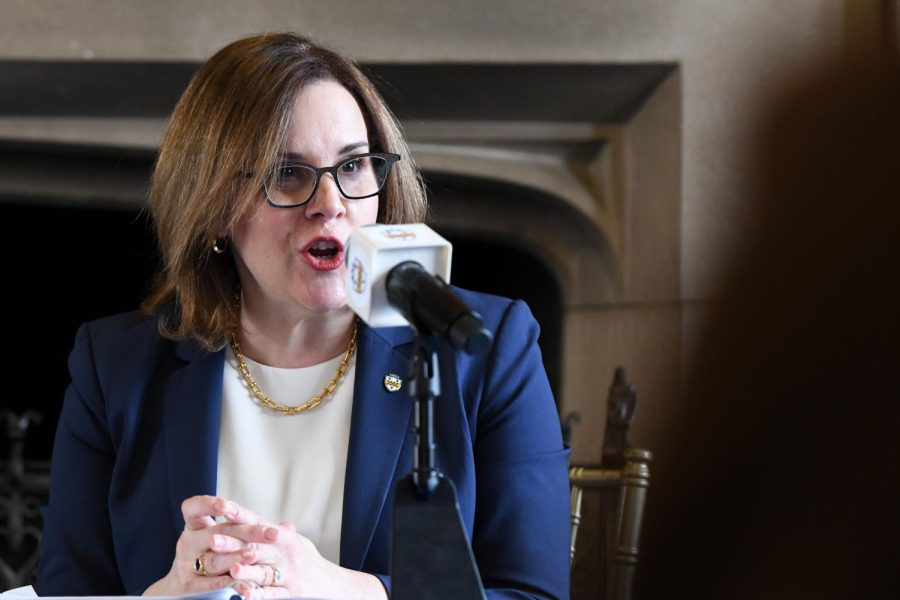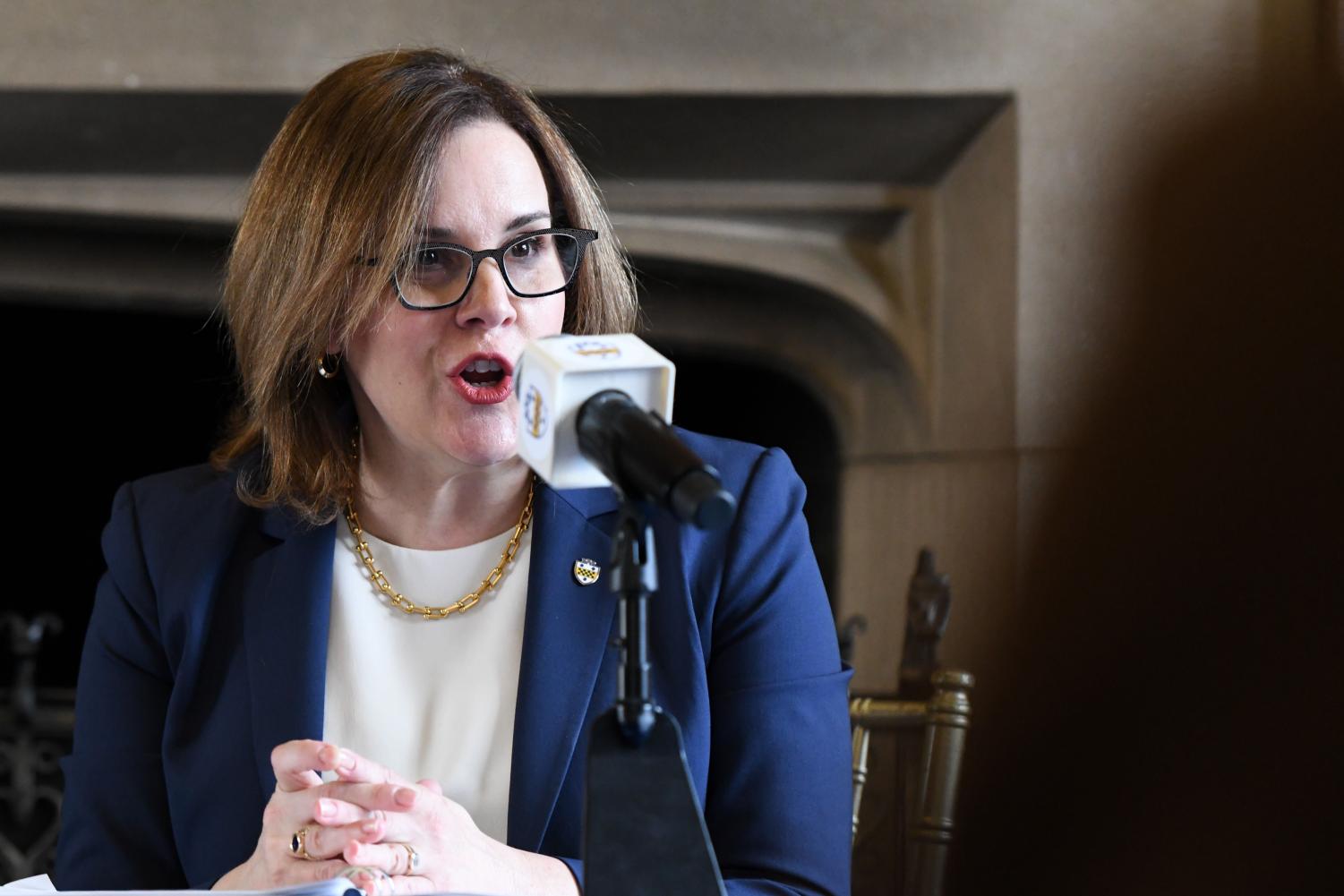Chancellor-elect Joan Gabel discusses unionization, ‘anti-trans’ speaker events
Chancellor-elect Joan Gabel speaks at a press conference in the Cathedral of Learning following her appointment.
April 4, 2023
Pitt’s new chancellor-elect Joan Gabel said she’s an “in-my-bones believer in shared governance” when asked about how she’ll approach ongoing compensation negotiations with the faculty union as well as staff and graduate student efforts to unionize.
“I think that the stakeholders and constituencies in shared governance should be able to come to the table, so to speak, in whatever form and with whatever voice they choose,” she said. Shared governance brings together various administrators, faculty, staff and students for decision-making.
Pitt’s Board of Trustees named Gabel, the current president of the University of Minnesota, on Monday as Pitt’s chancellor starting in July. Following her appointment, Gabel answered questions at a press conference about her stance on unionization, police relations and “anti-trans” speaker events on campus.
Graduate students narrowly voted against unionizing, while faculty members overwhelmingly backed unionization last year and are currently in contentious compensation negotiations with administration. Gabel said she believes the role of the administration is to work with stakeholders.
“Our job as the administration and in the governance is to meet people where they are,” Gabel said. “And so I will come to the table in whatever form is ultimately asked of us, and we’ll work together because I know we have the same ultimate goals.”
Gabel also responded to questions about recent protests on campus due to “anti-trans” speakers and how she might respond to similar situations in the future.
“It is arguably one of the hardest times in the thousand-year history of the model of higher education that we employ, to strike the balance between challenging thought and making people think about things they may not want to think about,” Gabel said.
“But putting [the law] to the side is to acknowledge and recognize when painful things happen, to provide the support and sometimes the counterposition so that our community can receive balanced information, balanced opportunity to learn and work together, to make sure that we’re very clear that while we respect and follow the law, we don’t endorse as a community what people sometimes say,” she added.
During her time as UMN president, Gabel limited the university’s relationship with the Minneapolis Police Department following George Floyd’s murder. She said the school wouldn’t use the police force for large events such as football games and concerts. Gabel said following an “incredibly reflective dive into [the Minneapolis PD’s] own processes from A to Z,” the university is once again collaborating with the PD.
“There’s a new police chief in Minneapolis, and we’re very proud to work with them,” Gabel said. “We’ve restored their relationship, that shared commitment to having public safety and policing respectful of values of our entire community.”
At the press conference, Gabel’s controversial decision to take a paid corporate board seat at Securian Financial, which has more than $1 billion worth of business with UMN, came up. She resigned from the position in January for “the best interest of the university.” The incident led UMN to review its conflict policies, following outcry from the governor and state attorney general.

Doug Browning, chair of the Board of Trustees, said the Board vetted the issue, “as we did with every candidate that we looked at.”
“We felt we had a satisfactory response,” he said. “And what you need to know is what happened in that instance is not unusual.”
Gabel said her contract allowed her to serve on for-profit boards, and that she received approval from UMN’s Board of Regents to take the position. She said there was “full public transparent approval of the opportunity.”
“People didn’t like it. I wouldn’t call it a controversy,” she said. “I would say they didn’t like it, and it became a distraction and so I stepped down.”
In addition to being the next chancellor, Gabel is also a Pitt mom. She said her child attending the University played a large part in her interest in the job.
“I’ve also seen [the platform for excellence] as a Pitt mom, which is a unique perspective that gives me and my husband Gary a behind-the-curtain look at what a wonderful place this is for the value of the academics, or the quality of the faculty and staff,” Gabel said.
Danielle Floyd, the president of Student Government Board and a member of the 26-peron search committee, said she is happy to see a woman in the position for the first time. Student leaders have criticized the selection process for the chancellor, which was largely behind closed doors.
“[With Gabel] being the first female chancellor that we’ve ever had, I’m really interested to see what new perspectives and leadership she brings to the university,” Floyd said. “I’m happy to be here for this historic moment to see this change, and I want nothing but greatness for her.”
Floyd described the selection process as “collaborative,” saying it “reflected the University’s commitment to shared governance.”
“Meeting with [Gabel] and talking to her in the search process, she was amazing and really stood out to us as a great candidate,” Floyd said.
Gabel said she wants to get to know people in the Pitt community when she starts her job.
“On a personal level, [I am focused on] really getting to know the community, the faculty, the staff and students, the leadership team,” Gabel said. “Lots of listening and learning and getting to know, and then starting to execute.”





